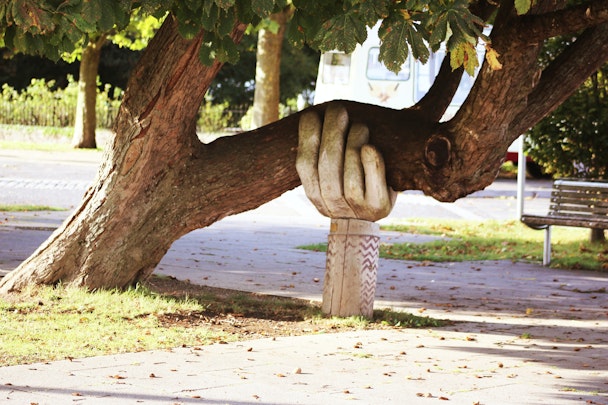‘The world is ready to listen’ Landor & Fitch’s Amal Atallah on ‘cultures of belonging’
The Drum sits down with Amal Atallah, general manager of branding and design agency Landor & Fitch, to talk about her big idea for making the industry more inclusive, especially for women: building “cultures of belonging”.

We sit down with Landor & Fitch to talk support and belonging / Neil Thomas via Unsplash
Though the representation of women at senior levels in marketing companies has been improving in recent years, it took a hit during the Covid-19 pandemic with women far more likely to lose their jobs than men. Meanwhile, industry groups make it clear that the industry still has much work to do in attracting and retaining diverse talent.
Some agencies go further than most in tackling these problems. Under the stewardship of general manager Amal Atallah, branding and design agency Landor & Fitch has put building a “culture of belonging” at the center of a diversity, equity and inclusion strategy that has seen it shortlisted for agency of the year gongs and listed as one of the UK’s best workplaces for women.
Atallah was born in Beirut, and began her career there in the financial services industry before moving to Dubai, working in consumer research. It was in Dubai that she moved into branding, as a client manager at Landor before the merger with its WPP sibling Fitch. Moving to London during her Landor tenure, Atallah had a brief spell at Fitch, and has been general manager at Landor & Fitch since its inception last year.
Hi, Amal. You’ve seen a few different industries and parts of the world. What’s the nature of the diversity problem for this industry?
Personally, I've been quite lucky. In my first job, I worked in an organization that was led by a woman. My exposure in our industry and beyond has been quite positive. But that doesn't mean that I didn't see things that didn't make sense.
Where we are today, in the marketing industry, we're in a much better place. But a lot of work still needs to be done, and that doesn't mean that the situation is similar across the world. It depends on where you are, on personal circumstances, and the people that you’re working for. So it's difficult to generalize and say, ‘this is where we are’. The problem is quite complex.
Advertisement
Amid all that complexity, what are the things that business leaders should focus on if they want to do better?
It’s very important to make sure that the work we do is representative of the world that we live in today and the world we want to create in the future. We need to make sure that the workforce is diverse – not just in terms of gender; we need to make sure that the people around the table discussing any topic are bringing different perspectives, looking at the problem from different angles, so solutions are not being developed from one lens, and will work for different people across a category or different parts of the world.
It's important to create a culture where people feel equal; where they feel that ‘this is a place where I can belong; this is a place where I can be myself; this is a place where I can bring my point of view, and I'm not afraid of saying what I have on my mind’. Once you have that, you start to unpack the problem. Otherwise, we only scratch the surface, and do something conventional. Everybody feels comfortable with that, but it's not going to change the world.
Advertisement
What might change the world?
It's funny: despite all the negativity that we have around us today, all the things that make you feel pessimistic, what gives me hope is when I speak to the younger people in our business. I sometimes I go to bed and think ‘these are people that want to change the world’. They have the dedication, they have a different perspective, and they have the commitment.
Leadership is being redefined by people like Greta [Thunberg] and Malala: these are people having a real impact on how leaders are thinking about the actions they take, their leadership style, and how they talk to people.
Suggested newsletters for you
At Landor & Fitch you’ve been very deliberate about cultural initiatives to drive that change. Could you talk to me about some of those?
It's a combination of things; it's not one-size-fits-all.
When I joined Landor & Fitch, there were a lot of people around me who were, in a way, role models. The business is full of strong women leaders who are not just defined by what they do: not just a CEO or president or head of department, but also a mother, for example. Not having to apologize for having to play more than one role is quite important: the ability to see that you can succeed in multiple aspects of your life. For me, that was an inspiration.
We have a group called the ‘building to belong’ team, educating all of us on what really matters. I’ve learned a lot from them. They’re not just looking at how we can make Landor & Fitch a good place to work, but the people we work with; who our suppliers are; are we being good people in everything we do? Culture starts in the studio, but evolves and lives beyond it.
We also have a lot of women in the business who are being coached and mentored. That lets you adjust your approach based on what makes sense for individuals. What are their personal experiences? Where do they need support? What potential do they have? You have to work together to help them evolve.
There's always something you can do better, and there's always something you can evolve. I don't think we've got it right. We don’t have the secret sauce. But we do have the commitment and the will. We're learning and evolving and people see it – people in the team see it and they say, ‘how can I contribute?’ You can achieve more with the team.
As you’ve said, the situation is complex. But where’s one place businesses can focus their efforts?
There's a lot of conversation around what we can do as business leaders; what culture we can create; how can we achieve gender equality. But there’s a lot [externally], like childcare policies and systems, that impact women in in leadership positions. And we've seen that during the pandemic, woman ended up with more childcare responsibilities than men.
The cost of childcare is horrendous... Ours is a client servicing industry, so women find themselves sometimes making decisions (‘I’m going to sacrifice my time, but the money that I'm getting is going to be used for childcare’) that would be avoidable if we had a better childcare system. It’s not fair, and it’s something that we can influence as an industry; we need to work with other organizations, opinion leaders and policymakers to allow women to do more.
We have an opportunity, right now, to make a huge difference, and the world is ready to listen. Despite all the things we’re going through, there is hope.
This interview has been edited for brevity and readability.
Content created with:

Landor
We are Landor. World-leading brand specialists. Consulting. Design. Experience.
Connecting business strategy to brand.Bringing every facet of brand to life.Creating...

